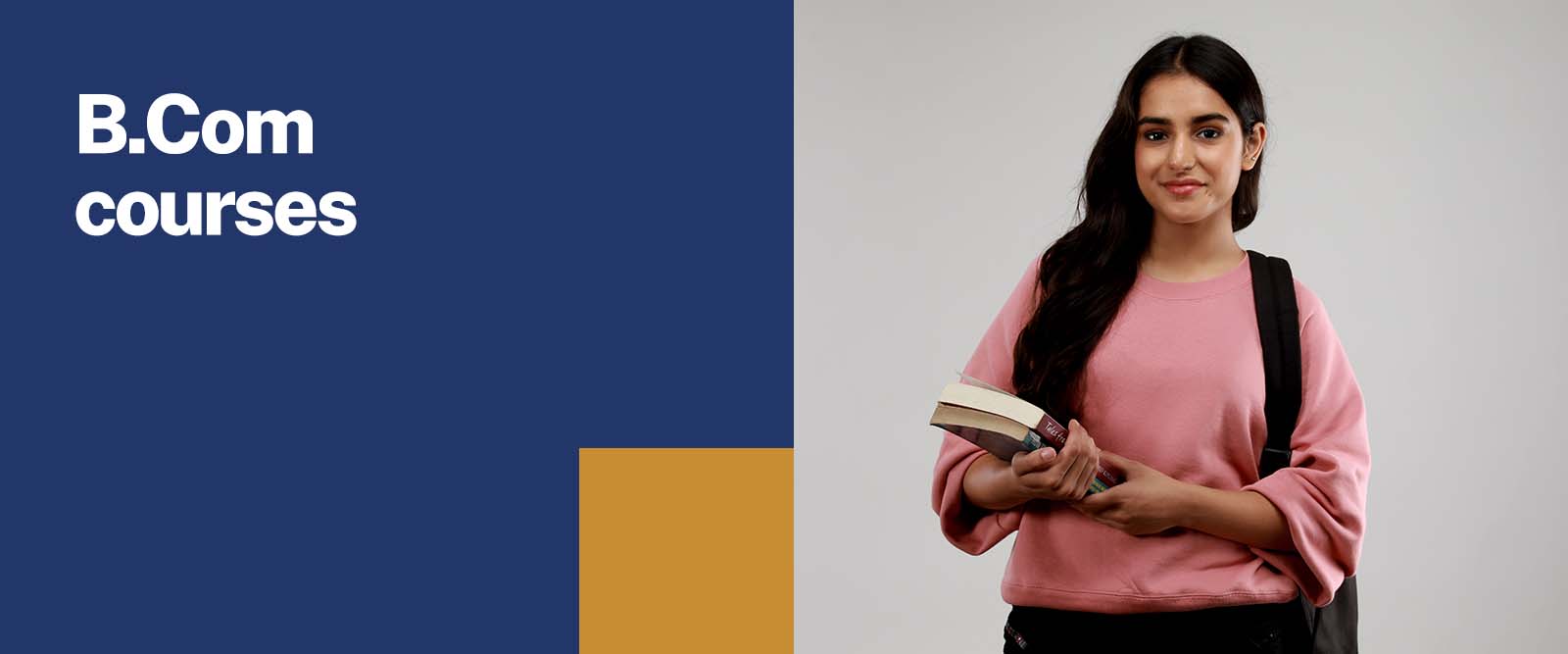5800 students unlocked their dream jobs with UG/PG programs in top colleges. Apply Now!
B.Com is the abbreviation for Bachelor of Commerce. B.Com is a three-year undergraduate programme comprising commerce, economics, business law, accounting, taxation, and finance topics. B.Com streams set the foundation upon which specialised commerce studies assemble. Students learn about business, finance, taxes, accounting, and administration at the undergraduate level.
The popular B.Com courses are appropriate for anyone interested in a career in commerce, accounting, finance, banking, or insurance. Students who complete a B.Com program have opportunities in finance and banking. After B.Com, many students start their careers in sales, which is a lucrative career path. Students interested in finance or commerce will also find plenty of opportunities.
Overview of B.Com Courses
|
Course Name |
Bachelor of Commerce (B.Com) |
|
Duration of a B.Com degree |
Three years |
|
Average course Fees |
₹2,500 to ₹65,000. Some prestigious institutes also offer B.Com courses with maximum annual fees of ₹1 lakh. |
|
Admission process |
Entrance or Merit-based admission |
|
Eligibility requirements |
10+2 in a commerce stream with a minimum of 50% overall score. |
|
Higher education degree related to B.Com |
Master of Commerce (MCom) or MBA after B.Com |
|
Job profiles |
Junior Accountant, Account Executive, Financial Analyst, Business Analyst, Auditor, Tax Accountant, etc. |
|
Average starting salary |
₹20,000 to ₹45,000 per month |
Eligibility Criteria for B.Com Courses
Aspirants seeking admission to B.Com courses in India must have completed their undergraduate degree with a minimum of 50% aggregate marks from any recognised board in any relevant discipline.
In addition, students must have passed the standard entrance examination with good grades from any reputable institute for admission to B.Com. In addition, there are no age restrictions for enrolling in the B.Com program.
Types of B.Com Courses
-
B.Com General
The general B.Com course focuses on a basic introduction to all topics within the commerce stream. The eligibility criteria for admission to B.Com Regular courses is 10+2 in a commerce stream with a minimum of 50% overall score. The average tuition fee for the BCom General course ranges between ₹25,000 to ₹1 lakh.
-
B.Com Honours
The B.Com. (Hons.) programme is a specially designed programme with a strong emphasis on specialisation in commerce. In most prestigious universities, the cut-off for admission to B.Com (Hons) is higher than that for acceptance to B.Com (Regular). Many types of B.Com honours intend to provide expertise in specific subjects. B.Com branches available under B.Com Honours are:
- B.Com in Sales & Marketing
- B.Com in Advertising
- B.Com Banking and Insurance
- B.Com in Accounting
- B.Com in Taxation
- B.Com in Finance
- B.Com in Human Resources
- B.Com in Auditing and Control
- B.Com in Transport and Logistics
- B.Com in Supply Chain Management
- B.Com in International Business
- B.Com in International Accounting
-
Online B.Com
Online B.Com is an efficient, simple, and cost-effective way to obtain a diploma. Leading universities offer online B.Com through MOOC (Massive Open Online Course) platforms. The authorities specifically design the course for students to study without regard for time or space constraints.
An online B.Com degree lasts three years and teaches students about Business Communication, Accounting, Finance, Business Law, and other topics. A full-time B.Com degree has a syllabus similar to an online B.Com degree.
-
Correspondence or Distance B.Com
Distance B.Com courses are available for students who are unable to continue their education in a classroom setup. B.Com distance education is a planned education that occurs away from the source or live classroom. Some of the reasons to pursue a B.Com Distance Education are as follows:
- Low tuition fees and miscellaneous expenses like transportation to the college.
- Numerous college options to study B.Com Distance Education
- Allows an individual to work and carry out studies at the same time.
- Allows a person to pursue a degree in commerce without leaving their job.
Top B.Com Colleges for B.Com Streams
There are approximately 8,840 B.Com colleges in India, including private, government, and public institutions. B.Com colleges in India provide courses at both the undergraduate and graduate levels. Students can evaluate the best course in B.Com considering the top NIRF-ranked B.Com colleges in India:
- Shri Ram College of Commerce, Delhi (NIRF Rank: 1st)
- Lady Shri Ram College for Women, Delhi (NIRF Rank: 2nd)
- Chandigarh University, Chandigarh (NIRF Rank: 3rd)
- Loyola College, Chennai (NIRF Rank: 4th)
- Osmania University College for Women (NIRF Rank: 5th)
- Hindu College, Delhi (NIRF Rank: 6th)
- Jain University, Bangalore (NIRF Rank: 7th)
- Hans Raj College, Delhi (NIRF Rank: 8th)
- Kalinga University, Chhattisgarh (NIRF Rank: 9th)
B.Com Course Syllabus
The authority designed the B.Com syllabus to provide aspirants with theoretical and practical knowledge of the various commerce subjects. Students learn about all major fields, such as finance and commerce, including Financial Services, Banking, Business, Industry, Management, and many others.
The first-year topics in the B.Com syllabus include studies on the core and foundational concepts of commerce. These subjects are critical to the understanding of the basic concepts for studets. The topics begin to differ in the second year due to the specialisation chosen by every student.
List of B.Com Subjects:
- Accounts
- Economics
- Management
- Mathematics
- Business Communication
- Computer Applications and IT
- Income Tax Laws
- Banking and Insurance
- Microeconomics
- Financial Markets and Institutions
- Indian Economy
- Corporate Accounting
- Elements of Corporate Law
- The Indian banking system and central banking
- Managerial Communication
- Marketing Management
Conclusion
During the B.Com courses, you will gain essential skills in finance, marketing, banking, and other B.Com streams. You will go on to work in positions such as corporate finance, financial analysis, credit analysis, financial consulting, risk management, or investment banking.
HELP
Take the first step towards your dream job.
ABOUT THE AUTHOR


